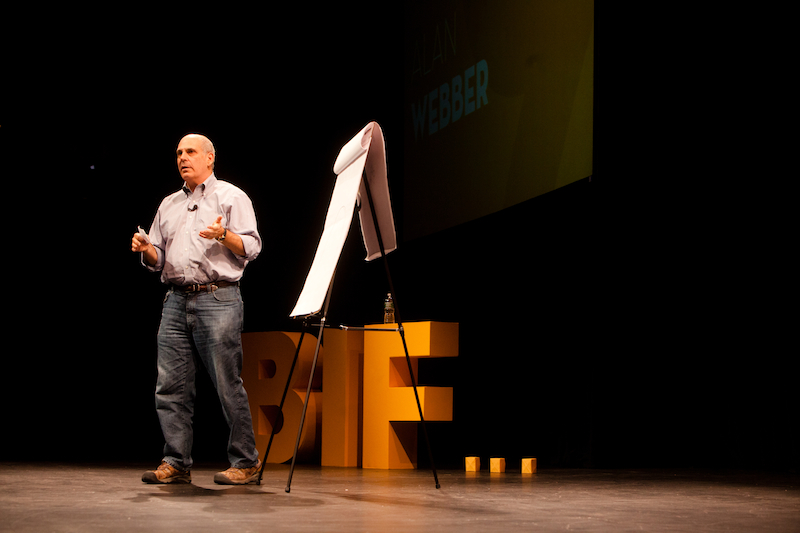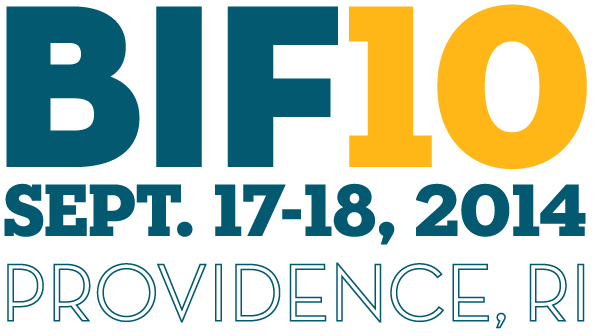

This is the second of a 10-article series of conversations with transformational leaders who will be storytellers at theBIF10 Collaborative Innovation Summit in Providence, RI, on Sept. 17-18.
“If you’re in business today, you’re running for office every day.”
So says Alan Webber, co-founder of Fast Company magazine and a progressive Democrat who recently conceded his bid for governor of New Mexico.
Webber promoted an education-focused, pro-jobs campaign platform that leveraged his background in social business. The only candidate in the race not formerly involved in the state’s government, his supporters valued his outsider perspective and resistance to local political cynicism.
Running for office may seem to be a tricky venture for a media entrepreneur with a blunt, provocative journalistic record. But to Webber, running for governor was a natural culmination of his career-long mission to understand and transform broken systems.
Webber’s talk at BIF9, last year’s Collaborative Innovation Summit, articulated the broken place he sees now in both business and politics. In both systems, he claimed, “something is wrong about the way we’re aspiring to success.”
In his talk, Webber recounted an article by entrepreneur Mark Fuller, published in Fast Company’s first issue. “It asked, ‘How did the United States manage to win every battle in Vietnam, and lose the War?’— because they lost track of the point of the exercise.”
To Webber, the same is true for American business and politics. “Every 10 years, we drive the economic car into the ditch,” Webber said, “It keeps happening because our systems are designed to create this outcome.”
At the BIF9 Summit, Webber’s ideas were welcomed. “Some conferences give you a feeling that all the talks were written by the same person, memorized, and then delivered as a Forrest Gump-ian box of chocolates,” he reflects. “The BIF Summit is different. The design specs are human-centric. With BIF storytellers, you get the feeling that there’s actual alignment between who they are and what they’re doing.”
Webber and fellow Fast Company co-founder Bill Taylor used their magazine to rally for a major cultural shift in business, a phenomenon that Webber referred to in his BIF talk as “the disappearance of the man in the grey flannel suit.” The concept of the company man who put himself aside so that he could put food on the table was no longer sustainable.
“Work is too important to be alienated from your sense of self,” Webber maintained.
Fast Company used the conceit of the worker drone to criticize America’s toxic work culture. The magazine aligned itself against an economy built upon principles of pure financial return at the expense of sound business practices.
“Fast Company wasn’t a business magazine,” Webber notes. “We had a business model, but we also had a philosophical agenda and a political sensibility about what makes for a good life. It wasn’t articles; it was a curriculum.”
+++
Alan Webber is tough to interview.
He refuses set questions. “Let’s have a conversation,” he insists. He openly shares what he’s struggling with and compels the same. He compliments generously, but does not endorse. He has deep laughter lines.
Yet, when prompted to talk about his new home state, his eyes light up. He tells many stories: of what he learned from meeting an education specialist at the local coffee shop, of listening to the stories of struggle of 16th generation Acequia stewards, of the privilege of having an audience with Pueblo heads of state.
He talks about his state’s resilience and cultural richness. “Santa Fe’s the oldest state capital in the United States, but you rarely hear about the history of Spanish exploration living at Plymouth Rock,” says the former Boston resident.
Webber claims he has no plans to disengage from public service. In his letter of concession he maintained, “It was not only a campaign to elect a candidate — it was a campaign to make an argument about New Mexico.”
The state, under the administration of Republican governor Susana Martínez, ranks 50th in the country in overall child well-being and job growth.
“When you’re number 50, you have no time to waste,” Webber says. To him, it doesn’t matter whether the case for New Mexico is made from the business, political or ethical angle “because today, they are increasingly the same.”
“Politics is not something you’d wish on your worst enemy,” Webber jokes. Yet, he also says, “I think running for governor was the right thing to do. I have met an amazing group of people through the campaign, people who’ve asked me to help them with their projects.”
He adds, “It’s a real a blessing when people think you can help them.”
The BIF Collaborative Innovation Summit combines 30 brilliant storytellers with more than 400 innovation junkies in a two-day storytelling jam, featuring tales of personal discovery and transformation that spark real connection and “random collisions of unusual suspects.”
Saul Kaplan is the author of The Business Model Innovation Factory. He is the founder and chief catalyst of the Business Innovation Factory (BIF) in Providence and blogs regularly at It’s Saul Connected. Follow him on Twitter at @skap5. Nicha Ratana is a senior pursuing a degree in English Nonfiction Writing at Brown University and an intern at The Business Innovation Factory. Follow her on Twitter at @nicharatana.
More Must-Reads from TIME
- Nicola Coughlan Bet on Herself—And Won
- What Kind of President Would Kamala Harris Be?
- Is Adrenal Fatigue Real?
- Why It's So Hard to Quit Vaping
- Our Guide to Voting in the 2024 Election
- The 10 Races That Will Determine Control of the Senate
- Column: How My Shame Became My Strength
- Meet TIME's Newest Class of Next Generation Leaders
Contact us at letters@time.com